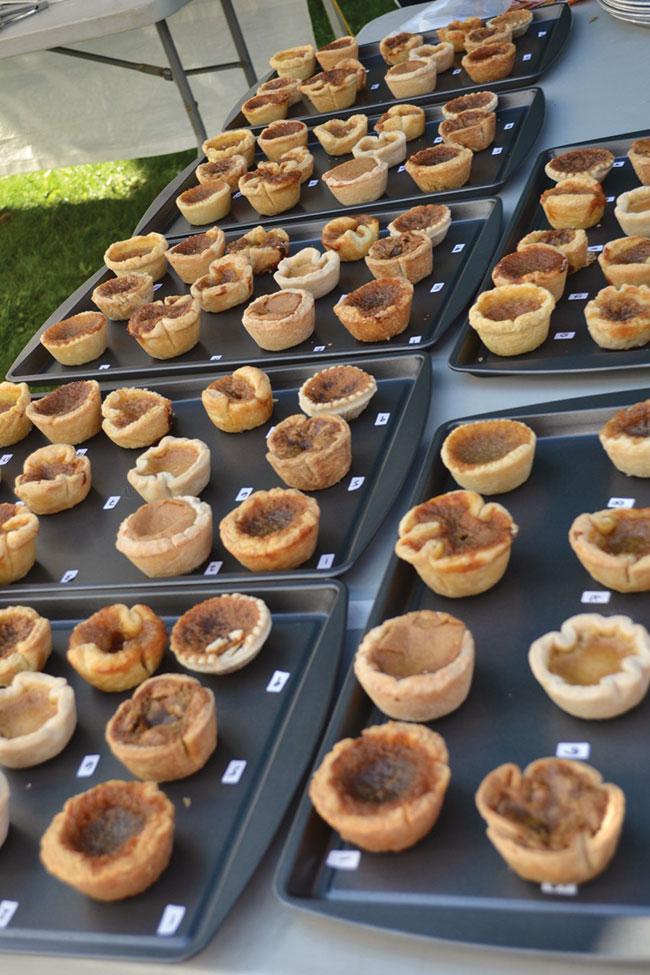
The Final Proof: August 2009
August 25, 2009
By Stephanie Ortenzi
When my parents moved back to the city after two decades of country
living, they settled in a culturally diverse neck of the suburban
Toronto woods – and that’s putting it mildly.
 |
|
| Portuguese custard tarts |
When my parents moved back to the city after two decades of country living, they settled in a culturally diverse neck of the suburban Toronto woods – and that’s putting it mildly.
A young Portuguese family had owned the house my parents decided to buy, and that brings me immediately to the Portuguese bakery four blocks away.
It’s nestled in a small plaza, with a dry cleaner on one side and a fish ‘n’ chips shop on the other. Here you’ll find the greatest custard tarts, a unique and glorious specialty, in my fanatical opinion. They’re as good as the best I’ve ever eaten, and I’ve easily eaten more than my fair share.
All of the continents are well represented among the neighbours up and down my parents’ new street. However, to see the area’s true cultural preponderance, you would swing by the plaza at the intersection of the two main thoroughfares nearby. You’d spot it right away. Forty per cent of the residents are Somali.
In that same plaza is a chain doughnut shop bursting with a Somali clientele, making it a mock-Mogadishu pocket of transplanted East African café society. It’s fascinating. I think of Ehsan Sairally’s piece on page 18 of this month’s issue, and I imagine the doughnut shop franchisee determining which of his offerings can pass for halal as a better way to cater to his customers.
Which makes me think about Portuguese custard tarts again.
They come to mind a lot, and each time I hear myself say, “Whoa, thank you, whoever you are, for inventing these lovely things, for teaching your apprentices to make them so well and for keeping them great into perpetuity, I hope.”
I have never had a lousy Portuguese custard tart, probably because no one has seen fit to invest the time it would take to master them, apart from their skilled Portuguese masters. Why bother? Why try to re-invent the wheel?
Similarly, I wouldn’t make Korean walnut cakes, Greek lookoumades, French mille feuille or those prune doughnuts from the Polish deli that my husband loves so much.
If I opened a café in my parents’ new neighbourhood, I’d want to offer the area’s Somalis something from their own culture, which made me wonder.
What is the Somali equivalent to that tart, a culinary totem whose quality survived decades and whose essential techniques are not easily mastered?
Cursory web research unearthed some surprises, including the reminder that Italy colonized the country for nearly 80 years. That’s plenty of time for a culinary osmosis, and that’s exactly what turned up in a series of homemade YouTube cooking shows, in which a Somali chef demonstrated Italian dishes in his native tongue.
Most enjoyable to watch was this gentleman’s tiramisu, his narration peppered with occasional English words – ladyfingers, mascarpone cheese, brandy. Brandy? Perhaps he was hoping that his audience went beyond gourmets who follow a strict halal diet.
Unapologetically, I would say that I couldn’t be a fan of his tiramisu, only because the pale coffee he used for dipping his ladyfingers was clearly not espresso, and that’s one of my tiramisu non-negotiables. Espresso and real mascarpone.
He also had an episode on making a marinara sauce and zuppa inglese, which translates literally from the Italian as “English soup,” a tongue-in-cheek comment on how frequently the English eat custard.
My research did unearth some of the native Somali sweets and their pretty names: shushumoo (cookies), bukut (biscuits), keek (cake), sambus (pastry).
For my imaginary shop – which I’m financing with other people’s imaginary money, by the way – I would find a good Somali bakery, and cut a wholesale deal to keep my pretend shop stocked with these little treasures. Forget the margin loss. My customers would be happy. They’d be impressed. They’d tell all their friends. They’d keep coming back.
Following that entrepreneurial bromide – sell your strengths and buy your weaknesses (my weakness being authentic Somali sweets) – I would make pizza the way traditional Italian bakeries do: light on toppings and doughy, because an Italian bakery worth its salt seizes every opportunity to share the magic of what they can do with flour, yeast and water.
Finally, most importantly, the pizza would be halal, which would be
dead easy.
Which brings me back to the Portuguese custard tarts, a lovely place to be, each bite a humbling reminder that this pastry is good because it was rendered by a master’s touch.
Thinking about what jewels I could sell in my shop that my clientele would love, and which I could produce with adequate quality, I came up, ironically, with tiramisu, which I could make halal easily enough. Come to think of it, tiramisu is something I could metaphorically knock out of the park, with pleasure.
I just realized. My personal Portuguese custard tart is tiramisu. Who knew?
Print this page
Leave a Reply